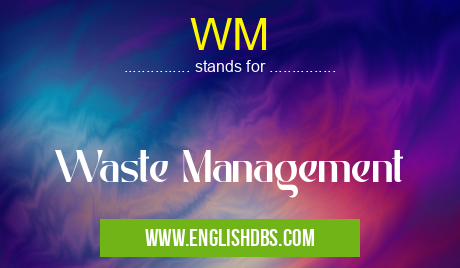What does WM mean in COMPANIES & FIRMS
Waste Management (WM) is a major global concern which requires an organized and efficient approach to ensure proper disposal and reuse of resources. WM is the practice of collecting, transporting, treating, disposing of, and recycling solid waste materials in an effort to reduce their environmental impact. WM also involves reducing the amount of waste produced and using more efficient methods for handling it. By properly managing our waste, we can help protect the environment, protect human health, reduce waste-related costs and make better use of natural resources.

WM meaning in Companies & Firms in Business
WM mostly used in an acronym Companies & Firms in Category Business that means Waste Management
Shorthand: WM,
Full Form: Waste Management
For more information of "Waste Management", see the section below.
Waste Management Components
WM consists of the components of collection, transport, treatment, recycling and disposal. Collection is the initial stage where solid waste materials are stockpiled by local service providers or local authority municipal services. Transported with specialized vehicles from collection centers to treatment plants or final disposal facilities like landfills or incinerators for burning. Treatments involve activities such as composting for organic materials, recycling or reusing certain types of materials such as metal and aluminum cans, paper and plastics; generally achieved by sorting wastes into categories at collection centers before they reach the disposal facilities. Recycling refers to transforming used products into raw materials which can be reused in production processes; while disposal is the final stage where discarded items are safely deposited into landfills or incinerated for energy recovery purposes.
Benefits Of Proper Waste Management
Properly managed waste brings several benefits - from reducing pollution levels in our environment to cutting down on dangerous greenhouse gas emissions associated with landfill sites. Additionally, it reduces costs related to hazardous chemicals being disposed off improperly as well as aids in preserving non-renewable resources by properly reusing scrap material that would otherwise have been thrown away. It also promotes public health by avoiding illnesses due to improper handling or storage of wastes; encourages green jobs; helps create new sources of energy through incineration; and allows cities to practice sustainable development initiatives by focusing on resource conservation objectives such as making use of renewable energy sources or encouraging citizens not to buy products with excessive packaging.
Essential Questions and Answers on Waste Management in "BUSINESS»FIRMS"
What is Waste Management?
Waste Management is the process of collecting and disposing garbage, sewage, and other waste materials. It involves both in-house actions such as storage and transportation, as well as external processes such as recycling, composting, incineration, and landfilling.
What services does Waste Management provide?
Waste Management provides a variety of services related to the collection, sorting, and disposal of various types of waste. These services include residential trash collection, commercial waste collection, hazardous waste collection and disposal, recycling programs for paper, plastic, glass and metal materials, composting initiatives for organic materials, and landfill management.
How can I get started with a Waste Management program?
Depending on what type of program you need to set up (residential or commercial) there are different resources available to help you get started. Residential programs typically start with contacting your local city hall or municipal office to find out what specific requirements may be necessary to begin service with a trusted provider. Commercial programs may require additional research into applicable regulations in order to comply with local laws before getting started.
What are some common ways to reduce waste at home?
The most effective way to reduce waste at home is by making small changes in our daily habits that can add up to big benefits for the environment over time. Some easy tips for reducing household waste include taking shorter showers, only running full loads of laundry and dishes when possible, switching from disposable products (plates/cutlery) to reusable ones when entertaining guests at home, composting food scraps instead of throwing them away and opting for e-bills instead of paper bills whenever possible.
Is recycling always better than sending it to the landfill?
Yes - recycling is generally preferred over sending items to the landfill because it allows us to extend the life cycle of products by breaking them down into their raw materials which can then be used again in some form or another. Not all items should be recycled however - certain hazardous products such as batteries or electronics should always be disposed of properly through designated collection points or special drop-off centers.
Are there any alternatives to traditional landfilling methods?
Yes - One popular method used by many organizations today is incineration which uses high temperatures along with special filters in order optimize combustion efficiency while minimizing pollutants released into the atmosphere during this process. Another helpful alternative is soil stabilization which refers to adding certain binders like cement powder or quicklime sludge onto landfills as a way of reducing leaching potential from hazardous substances that may be present within these sites.
What are some different types of hazardous wastes that can't go in regular trash cans?
Common types of hazardous wastes that cannot go into regular trash cans include batteries (both rechargeable and single use), electronics (computers/monitors/smartphones), paint/pesticides/solvents/adhesives/fluorescent bulbs/medical sharps (needles). All these items require special handling procedures due their potential impacts on public health if not safely managed during their disposal process
Final Words:
Overall, if applied effectively WM provides many economic opportunities while minimizing environmental problems caused by unmanaged solid waste materials in our society today. It is important that individuals take an active role in managing their own waste streams responsibly so that we can make significant progress towards creating a more sustainable world for generations to come.
WM also stands for: |
|
| All stands for WM |
